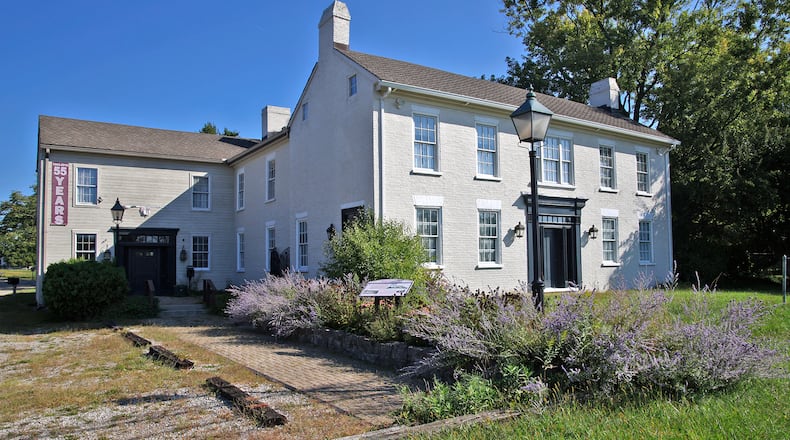The property at 8518 E. National Road had served for decades as a lamp shop and also once was an inn.
The proposal is to turn a mixed-use space into a group home run by New Housing Ohio (NHO) for people who are disabled due to mental illness, Jim Lagos, an attorney representing property owner Denna Johnson, said at a public meeting Thursday. He said after discussion with several residents nearby the more than three acres of property, the applicants will agree to 12 conditions, if the proposal passes.
These include criminal background checks for residents, prohibiting people who are not U.S. citizens from living in the home, NHO staff or residents’ family members providing transportation, comprehensive drug screenings, never conducting drug or alcohol rehabilitation, complying with the Ohio Basic Building Code for renovations, providing a tour of the facility for the public once it’s finished, annual septic system inspections, giving special consideration to disabled veterans and eastern Clark County residents, plus banning firearms and alcohol consumption on the property.
A group home is defined as a facility that houses six or more individuals 24/7, providing support for those who are disabled due to mental illness or age, or for other reasons must live in a supervised environment, but are able to respond to an emergency situation without personal assistance, Rachel Ricketts, community development planner, said.
Luke Russell, executive director of the National Alliance on Mental Illness Ohio, which is partnering with NHO on the project, said that housing is key to the success of people experiencing mental illness.
“There is no greater need for those who have mental illnesses and those with disabilities than quality long-term housing,” Russell said.
Russell said the property is a “more than ideal” location for a group home, which would allow people with disabilities to thrive.
The site has served many purposes: it was once the Buena Vista Tavern, a camp ground, a private residence and the old Johnson’s Lamp Shop.
Lagos said the exterior of the building will remain “pretty much the way it is.”
Russell said he hopes to fight the stigma these individuals face. One particular myth he said many believe is that most people with serious mental illnesses also struggle with addiction, but the rate is actually about 30% of individuals.
“If this (proposal) goes down, we’ve educated some people about the truth, and that’s what I care about,” Russell said.
If approved, the group home will have a “full range” of social services, and mental health professionals from local agencies will be involved, Russell said.
Credit: Bill Lackey
Credit: Bill Lackey
More than 60 Clark County residents attended Thursday’s meeting, with many speaking against the proposal. The room was packed with some residents standing in the hallway.
Many opposition comments were met with cheers and applause while some comments made by the applicants were interrupted with protests.
Several people said they were concerned about the state of the septic system, which is old and expected to fail. Others were concerned about the safety for nearby residents, schoolchildren and drivers in the area.
Zoning Commission Chairperson Ken Brust expressed concerns about the residents of the group home if the septic system fails. He also said he feels that the drug screening is “worthless” if these are not performed randomly on a regular basis.
One opponent of the group home urged others against it to be cordial in their actions and words, as he said Johnson had received threats.
Scott Boone, NHO president, said during the meeting that no children will live in the group home and there are no plans to turn it into a youth group home or substance abuse rehabilitative center.
Some residents opposed to the facility said the location is unsuitable and a better location would be downtown Springfield, closer to emergency services.
“Move it downtown where you’ve got clinics that are close, police close ... and leave the people and this beautiful area alone,” a South Charleston resident said.
One resident presented commissioners a petition against the project, which garnered 861 signatures.
“I understand why everyone’s upset. I get it; you don’t want this in your backyard, but folks are living in our communities with mental illness without the kind of support that we’re offering,” Boone said.
County spokesperson Mike Cooper said the proposal next will go in front of the Clark County Commission, where a decision will be made. No date has been set for that yet. A majority vote, meaning two of the three commissioners, are needed to approve or reject the request.
About the Author

